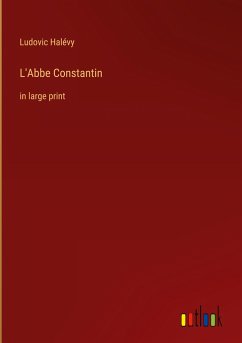
L'Abbe Constantin by Ludovic Halevy, Fiction, Classics, Literary
Versandkostenfrei!
Versandfertig in 1-2 Wochen
12,99 €
inkl. MwSt.

PAYBACK Punkte
6 °P sammeln!
CROWNED BY THE FRENCH ACADEMY Ludovic Halévy was a French dramatist and novelist, the son of Léon Halévy and a nephew of Jacques François Fromenthal Halévy. He was educated at the Lycée Louis le Grand in Paris, and after graduating he entered the service of the government. During this period he wrote several comic operas under the nom de plume of "Jules Servières." His success with these induced him to resign his position, and devote himself entirely to the drama in association with Henri Meilhac. The operas written by Halévy and Meilhac were successfully produced on nearly all the sta...
CROWNED BY THE FRENCH ACADEMY Ludovic Halévy was a French dramatist and novelist, the son of Léon Halévy and a nephew of Jacques François Fromenthal Halévy. He was educated at the Lycée Louis le Grand in Paris, and after graduating he entered the service of the government. During this period he wrote several comic operas under the nom de plume of "Jules Servières." His success with these induced him to resign his position, and devote himself entirely to the drama in association with Henri Meilhac. The operas written by Halévy and Meilhac were successfully produced on nearly all the stages of Europe and America. In addition to dramas Halévy produced novels and stories.












